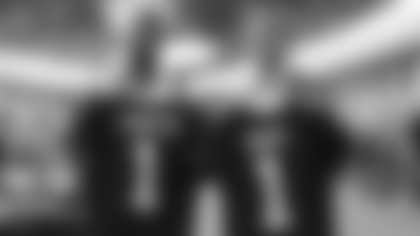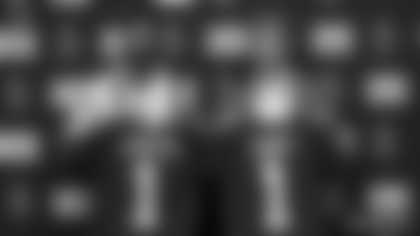Ten years later, Eli Manning reflects on the Giants 2007 playoff run capped off by Super Bowl XLII:
For a team that would go on to accomplish so much, the 2007 Giants began the year mired in uncertainty. Coach Tom Coughlin had almost been dismissed after the previous season and was thought to be on shaky ground. Tiki Barber, the franchise's career rushing leader, had retired after running for 1,662 yards in 2006. Future Hall of Fame defensive end and team leader Michael Strahan contemplated retirement and never reported to training camp. The Giants had a new defensive coordinator in Steve Spagnuolo. Eli Manning's record as the starting quarterback was 20-19 – plus 0-2 in the postseason. Dallas and Philadelphia were the favorites to win the NFC East, with the Giants considered fringe contenders.
"We had a team that had been together for a few years since Coughlin came in as the head coach," Manning said. "I was going into my fourth year. Even though we made the playoffs the two years prior, we hadn't won a game in the playoffs and we weren't a dominant team. I think there was a lot of pressure on everyone to step up."
It took a while for them to get going, but step up they did. That team was one of the most successful and memorable in the 93-year history of the franchise, one that delivered its seventh championship and was honored on its 10th anniversary during the 2017 season.
Although the Giants had many vital contributors, none was more important than Manning, the always cool and calm quarterback. His regular-season statistics weren't particularly impressive. Manning completed 297 of 529 passes (56.1%) for 3,336 yards, 23 touchdowns and 20 interceptions – including three that were returned for touchdowns in a loss to Minnesota. His passer rating of 73.9 ranked 25th in the NFL.
But Manning was outstanding in the clutch, a trait that has persisted throughout his storied career. When the Giants needed a big play or a pinpoint pass, he almost always delivered.
That was particularly true in the four-game postseason, when Manning completed 72 of 119 passes (60.5%) for 854 yards, six touchdowns and just one interception – and that on a tipped pass. After a 10-6 regular season, he led the Giants to playoff triumphs at Tampa Bay, at Dallas and at Green Bay (the latter two teams had handily defeated the Giants early in the season) before an epic 17-14 victory in Super Bowl XLII against a New England Patriots team that entered the game 18-0, including a victory over the Giants in the regular-season finale.
The Giants were locked into the NFC's No. 5 seed before that game, so many members of the media and a large segment of the football public expected them to rest some of their regular players against the Patriots. But Coughlin and the players had other ideas.
"You're just waiting on your orders and Tom said, 'Hey, we're going to play, and we're going to play to win,'" Manning said. "I was excited offensively just because in Buffalo (the previous week) we didn't play great offensively in tough conditions, and against Washington before that we didn't play well, so I just kind of wanted to get into a rhythm, see if we could get a little confidence going offensively. And sure enough, we were aggressive early on, hit Plaxico (Burress) on a big post route and jumped on the board and scored some points. I thought it was good offensively for us in our confidence to say, 'We can score, we can do our part here.'"
The Giants held a 12-point lead in the third quarter before New England rallied for a 38-35 triumph. But to the Giants, it wasn't so much a defeat as it was proof that they could beat the seemingly invincible Patriots if they got another chance.
"It didn't quite work out, but I think it was good for the whole team," Manning said. "That was the best team and we went wire-to-wire with them through the fourth quarter. We knew we could hang with anybody, we can beat anybody, we just got to go out there and do it, we just gotta play our type of football."
When the playoffs began, the Giants were as lightly-regarded as they had been at the start of the regular season. The NFC favorites were the Cowboys and Packers, who had each finished 13-3. The Giants weren't even expected to beat a Tampa Bay team that had won the NFC South title with a 9-7 record.
But the Giants defeated the Buccaneers with relative ease, 24-14. Manning threw touchdown passes of five yards to Brandon Jacobs and four yards to Amani Toomer, and Jacobs also scored on an eight-yard run. Manning completed 20 of 27 passes for 185 yards, and Jacobs and Ahmad Bradshaw ran the ball 30 times for 100 yards.
"Tampa's offense, they weren't going to score a lot of points," Manning said. "I knew offensively we could be patient and just run the ball, pound the ball, get completions, and hit a couple plays when we had opportunities. I felt good about our chances. Tampa's defense played outstanding. Offensively, we just kind of did our part, ran the ball, had some nice drives, and scored enough points to win the game."
Then it was on to top-seeded Dallas, which had twice defeated the Giants in the regular season by a combined score 76-55. By then, it was to the Giants' advantage to play another road game. In the second half of the regular season, they had improbably gone 0-4 at home and 4-0 as visitors. Their victory in Tampa was their eighth straight on the road after an opening night loss to the Cowboys.
"Dallas was playing great," Manning said. "We had played them pretty good. They were good, but we kind of had that confidence."
On the game's first possession, Toomer caught a pass that normally gained about 12 yards and turned it into a 52-yard touchdown. With 53 seconds remaining in the second quarter, Dallas took a 14-7 lead on Marion Barber's one-yard touchdown run. But that was more than enough time for Manning, who expertly led the Giants 71 yards in seven plays, the last a four-yard touchdown pass to Toomer with only seven seconds remaining.
"Sometimes you gotta make some plays and I hit him on a little completion, he turns it into a touchdown," Manning said of Toomer. "We had a drive right before halftime, get Amani for another touchdown, so we tied the game going into halftime, which was good. In the second half, the defense started going after Tony (Romo)."
Jacobs' one-yard touchdown run on the third play of the fourth quarter gave the Giants a 21-17 lead. In the frenzied final moments, Dallas drove to the Giants' 23-yard line, but Romo's pass into the end zone for Terry Glenn was intercepted by R.W. McQuarters.
"I wasn't nervous, I knew they needed a touchdown," Manning said. "But they had some good players - T.O (Terrell Owens), and Tony throwing touchdowns, and a good offensive line. They had won some close games, and had the ability to do that. You felt good, but yeah, you're pacing on the sideline a little bit."
The Giants had advanced to the NFC Championship Game against the Packers, who had crushed them, 35-13, in Week 2. The game was played on the hallowed grounds of Lambeau Field, where the game-time wind chill was 23 degrees below zero, making it the coldest game in Giants history. That evening, the term "pregame warmup" took on a whole new meaning.
"Amani and Plaxico and I used to go out two hours before kickoff and do our little warmup," Manning said. "We got out there and I'm tossing and they're getting loose, and it's (normally) a 20-25 minute workout. I think we made it five or six minutes, and I was like, 'I'm loose, are you good?' I saw them catch balls, they weren't using their hands at all, they tried to catch everything with their body. I was like, 'I think we're ready, y'all ready?' and they were like, 'Yeah, we're loose, let's go.' So we called it quits. I said right there, 'I gotta keep my hands warm at whatever cost.' If your right hand gets cold, it's just hard to function and make throws. So I had to get as many hand-warmers and have a plan to keep that right hand as warm as possible."
In the brutal conditions, Manning completed 21 of 40 passes for 251 yards. He threw neither a touchdown pass nor an interception.
"(I had) no trouble throwing," Manning said. "You don't forget about the cold, but once you're out there, you're throwing, you're playing football. You come to the sideline and I gotta keep my hand warm. But you kind of get warm, go back on the field and play 5-6-7 minutes and then you're back on the sidelines getting warm again, so you never got cold-cold. The pouch (he wore around his waist) is for the hand warmers when I'm out there. When I came to the sideline, I had another special kind of glove I put on that had like 10 hand warmers. You had packets of hand warmers in there, so you'd come out sweating. And then you're standing by the heater the whole time. Early in the game, I talked to (quarterbacks coach) Chris Palmer on the phone. My hands were getting cold talking to him, so I said, 'I can't talk to you anymore, I'll see you at halftime.'"
Manning's favored target was Burress, who dominated cornerback Al Harris and finished with a Giants postseason-record 11 receptions for 151 yards
"We weren't throwing it down the field; it was more timing routes and on the outside and hitting Plaxico on a hitch route and fade routes," Manning said. "I think eight of them were really the same route. It was like a hitch route, and if he was pressing, we reverted to a fade. Sometimes I threw it back shoulder, sometimes he went inside and it looked like a slant, but still we just kept running a hitch or fade or a back shoulder. One time, he didn't win and I ended up going to the other side hitting Amani Toomer down that left sideline where he had a great kind of toe taps laying out on the left sideline. It wasn't a complex passing game. It was just they were playing man-to-man, and we liked our guy versus their guy and they felt the same and Plaxico won that day."
After Lawrence Tynes missed two fourth-quarter field goal attempts, including a 36-yard try on the final play, the Giants lost the overtime coin toss. But on the second play of OT, Corey Webster intercepted a Brett Favre pass and returned it to the Packers' 34-yard line. The Giants gained five yards before Tynes ran onto the field to try the game-winning 47-yarder.
"I was worried," Manning said. "The 36-yarder at the end of regulation, you're feeling you're about to go to a Super Bowl and you don't make that. They get the ball first and they have Brett Favre. You're a little worried, but Corey Webster steps up. They try to throw some sort of corner route, and he steps in front of it and gets an interception, and all of a sudden we're in the driver's seat. We're in pretty good range, but not quite. In the cold, it was hard to kick, and it was hard to function, and you wanted to get a little closer. We didn't get much closer, had a big fourth down and didn't know what to do, but Tynes runs out onto the field and bangs it in."
When the Giants had lost to the Patriots in the regular-season finale, several players, including Justin Tuck and Rich Seubert, said, "We're going to play them again, and when we do we're going to beat them." Now they had their rematch in Super Bowl XLII.
But in the days prior to the game, it appeared they would have to play without Burress, who sprained his knee when he slipped in the shower. He tried to practice on Friday, but left the field almost immediately.
"We didn't know if he would play," Manning said. "He didn't practice all week. But for the first 12, 14 games of the season he didn't practice all week (because of an ankle injury) and just played on Sundays. It wasn't ideal. Toward the end of the year, he started practicing on Friday's a little bit. It wasn't a big deal that he didn't practice all week, he was going to be ready to play."
Burress' substitute in practice was David Tyree, who was best known for his special teams prowess. Two days before the game, Tyree handled the football as if he had lobster traps on his hands.
"It's a red and green zone practice basically, short yardage, goal line, and David Tyree probably has the worst practice of anybody I've ever seen," Coughlin said. "He can't catch a thing, he drops every ball, ball hits him in the helmet, ball hits him in the shoulder. He just can't catch anything that day."
Manning, whose passes Tyree kept mishandling, remembers it well.
"He's probably saying it wasn't as bad as I claim it was," Manning said. "But from my memory, it was a very bad practice. I've had bad practices, I've had bad games, and this is right up there with the worst of 'em. Plaxico was going to give it a shot, and he ran one route and said he couldn't do it. So Tyree's going to fill in that spot, he's going to be our X (split end), and he just caught a case of the drops that day, just dropped a lot of passes."
But after the workout, Manning did what quarterbacks, team captains and leaders do and spoke with Tyree.
"I told him, 'Hey, you're a gamer, you show up in games, you showed up in the Chicago game (when Tyree had two big catches), you showed up in other games and made big catches for us,'" Manning said. "I knew he'd step up."
He did just that. So did Burress, who played despite his knee injury.
A year earlier, Manning's older brother Peyton had led the Indianapolis Colts to a Super Bowl victory against Chicago. Now Eli, just a month past his 27th birthday, had his chance to duplicate the feat. It was a monumental opportunity. But Manning tried not to think of the enormity of the situation, and instead focused on the game plan, and what the Giants needed to do to win.
That was still his mindset when he first stepped onto the field at University of Phoenix Stadium. In that moment, so many players think about their long football journey bringing them to the pinnacle of their sport, the Super Bowl.
"I tried not to," Manning said. "I remember talking to my brother or other quarterbacks – or even Amani Toomer, who had played in a Super Bowl (losing to Baltimore in Super Bowl XXXV). I remember him saying how he was just sitting there taking everything in, that he made it to a Super Bowl, and you look up at the clock and the first quarter's gone and the second quarter and you're down 10 points. It's like, 'You don't have time to take it in, you gotta play.' Take it in after, take in the win, but you can't just sit there thinking, 'I'm playing in the Super Bowl. You gotta show up and be ready to play."
Manning and the Giants certainly were. They took the opening kickoff and promptly bled 9:59 off the clock on a 16-play, 63-yard drive that ended with Tynes' 32-yard field goal. Laurence Maroney's one-yard run on the first play of the second quarter gave New England a 7-3 lead, which held up through the end of the third quarter. After combining for 73 points in their first meeting, the teams were engaged in a defensive smackdown five weeks later.
Early in the fourth quarter, Tyree made one of the big plays Manning had predicted when he caught a five-yard touchdown pass to put the Giants ahead, 10-7. For Tyree, it was a mere warmup to a much bigger show.
After Randy Moss' six-yard touchdown reception regained the lead for New England at 14-10, the Giants took possession at their own 17 with 2:39 remaining. After Jacobs picked up a key first down on fourth-and-one, the Giants soon faced a third-and-five at their 44. What happened next was one of the most famous plays and greatest catches in Super Bowl history.
Offensive coordinator Kevin Gilbride called "76 union Y sail." The pocket collapsed in front of Manning, who somehow slipped away from three defenders, set his feet, and fired the ball deep down the center of the field. Tyree, who had lined up on the right side, leaped high for the ball, and used both hands to position it against his helmet as he bent backward and safety Rodney Harrison attempted to dislodge it. The most extraordinary catch in Super Bowl history gained 32 yards.
And the man who threw the ball had no idea what happened.
"If that's the first quarter, I probably don't throw that pass," Manning said. "But fourth quarter, third down, running out of time, we needed a chunk and put it up for him. I saw him there and you know desperate times, desperate measures, and so gave him a shot hopefully it was – I knew there wasn't a ton of other guys around, but hopefully he was going to catch it or nobody and then we got fourth and five.
"I didn't know if he caught it or didn't catch it. You maybe want to run a play or clock it or something so they can't challenge it, but we had to take a timeout. So I asked David, 'Did you catch it?' and of course every receiver always says they caught it. It could have bounced six times and they said they caught it. I was like, 'No, David, really come on, you got to tell me the truth. He was like, 'I promise you, I caught it.' And sure enough you see the replay and you kind of see everything that went on, hitting the helmet and holding onto it and how impressive it was. But it really wasn't until after the game, watching replays of it on T.V. eight hours after the game, that you see it over and over again how awesome of a catch it was."
It gave the Giants a first down on the Patriots' 24-yard line. Manning was promptly sacked for a one-yard loss and threw an incompletion, setting up a third-and-11. He threw to the right side for Steve Smith, who picked up 12 yards and a first down on the 13.
Now it was Burress' turn. The Giants' hobbled leading receiver had caught only one pass, a 14-yarder for Manning's first completion of the game. Now he lined up wide left. On the snap, Burress made an inside move that faked out cornerback Ellis Hobbs, then moved left and caught Manning's pass for a 17-14 lead with just 34 seconds remaining.
"They finally came out with an all-out blitz, and we had Plaxico going up on a fade route if they did that and had a good matchup and throw it up to him," Manning said. "I threw it early just because I knew it was an all-out blitz, and I didn't have a ton of time. But I saw I was going to have enough time, so I threw it before he made the break. He ran a good stick, like he was running a slant, and the corner jumped the slant. I was hoping the ball was going to get down - hurry up and get down and so he can catch it. It was one of those he's too open, you're just going to have to throw it up to him and you know Plax ran a great route. It was a nice way to get a game-winning Super Bowl (touchdown)."
Is there a bad way?
After the defense stopped the Patriots on their last desperate possession, the colossal upset was complete. After taking a knee on the final play, Manning hugged as many teammates as he could find, found his fiancé – now wife – Abby – held the Vince Lombardi trophy aloft and was interviewed on the podium set up in the middle of the field, met the media, and then retreated to the locker room, where he shared a private moment with Peyton.
"I remember talking to Peyton, and he was talking about the Tyree play and the catch," Manning said. "I was kind of asking him what the catch was like, because I hadn't quite seen it all."
Two days after the game, the Giants were honored by perhaps a million fans at a ticker-tape parade up Broadway in lower Manhattan.
"I remember just the amount of people," Manning said. "I thought I knew what a parade was. I grew up in New Orleans, and I had been to Mardi Gras. I guess I just didn't know what the Canyon of Heroes was, kind of heard about it, kept hearing the words, I just didn't realize everything about it; just the confetti and the people just as far as you can see - down the side streets, the blocks, people everywhere hanging out of buildings. It was awesome, just total chaos and an unbelievable experience going through that."
Ten years later, Manning and long snapper Zak DeOssie are the only members of the 2007 Giants still with the team – indeed, still active in the NFL. Though everyone else has scattered to their post-football lives, the group of men responsible for one of the greatest surprises in Super Bowl history, and one of the most unforgettable seasons in Giants history, will always be bonded by their magnificent achievement.
"Everything you went through that year," Manning said, "going through playoff games and going through the ups and downs, and to have it all work out to win a championship and just the hugs that go on in the locker room afterwards, that's love. That's just passion, and you don't lose those moments. Those memories are ingrained and embedded in your mind, and I think you do have a connection with all those guys. Obviously, with some more than others you're close with - the offensive linemen and Brandon Jacobs, Plaxico, and David Tyree, and Amani Toomer, and Ahmad Bradshaw. Those are special bonds and friendships and relationships you have forever."






